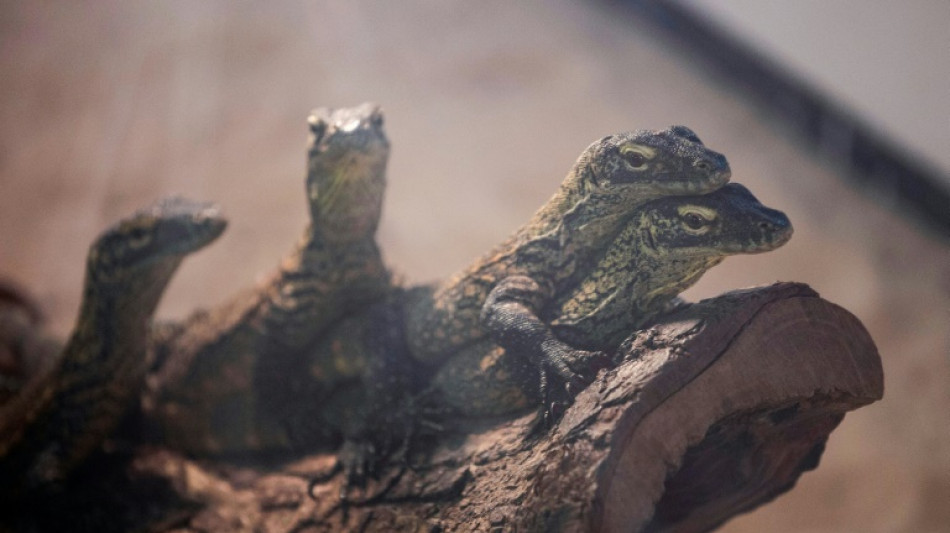
-
 US pushes forward trade enclave over Armenia
US pushes forward trade enclave over Armenia
-
Alpine release reserve driver Doohan ahead of F1 season

-
 Toulouse's Ntamack out of crunch Champions Cup match against Sale
Toulouse's Ntamack out of crunch Champions Cup match against Sale
-
US takes aim at Muslim Brotherhood in Arab world

-
 Gloucester sign Springbok World Cup-winner Kleyn
Gloucester sign Springbok World Cup-winner Kleyn
-
Trump tells Iranians 'help on its way' as crackdown toll soars

-
 Iran threatens death penalty for 'rioters' as concern grows for protester
Iran threatens death penalty for 'rioters' as concern grows for protester
-
US ends protection for Somalis amid escalating migrant crackdown

-
 Oil prices surge following Trump's Iran tariff threat
Oil prices surge following Trump's Iran tariff threat
-
Fashion student, bodybuilder, footballer: the victims of Iran's crackdown

-
 Trump tells Iranians to 'keep protesting', says 'help on its way'
Trump tells Iranians to 'keep protesting', says 'help on its way'
-
Italian Olympians 'insulted' by torch relay snub

-
 Davos braces for Trump's 'America First' onslaught
Davos braces for Trump's 'America First' onslaught
-
How AI 'deepfakes' became Elon Musk's latest scandal

-
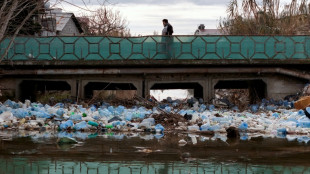 Albania's waste-choked rivers worsen deadly floods
Albania's waste-choked rivers worsen deadly floods
-
Cancelo rejoins Barca on loan from Al-Hilal

-
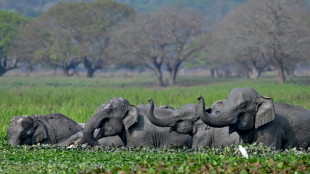 India hunts rampaging elephant that killed 20 people
India hunts rampaging elephant that killed 20 people
-
Nuuk, Copenhagen mull Greenland independence in Trump's shadow

-
 WHO says sugary drinks, alcohol getting cheaper, should be taxed more
WHO says sugary drinks, alcohol getting cheaper, should be taxed more
-
Arteta urges Arsenal to learn from League Cup pain ahead of Chelsea semi

-
 Davos elite, devotees of multilateralism, brace for Trump
Davos elite, devotees of multilateralism, brace for Trump
-
Spanish star Julio Iglesias accused of sexual assault by two ex-employees

-
 Trump's Iran tariff threat pushes oil price higher
Trump's Iran tariff threat pushes oil price higher
-
US consumer inflation holds steady as affordability worries linger

-
 Iran to press capital crime charges for 'rioters': prosecutors
Iran to press capital crime charges for 'rioters': prosecutors
-
Denmark, Greenland set for high-stake talks at White House

-
 Iranian goes on trial in France ahead of possible prisoner swap
Iranian goes on trial in France ahead of possible prisoner swap
-
Cold winter and AI boom pushed US emissions increase in 2025

-
 Hong Kong activist investor David Webb dies at 60
Hong Kong activist investor David Webb dies at 60
-
Try to be Mourinho and I'll fail: new Real Madrid coach Arbeloa

-
 Vingegaard targets Giro d'Italia and Tour de France double
Vingegaard targets Giro d'Italia and Tour de France double
-
South Korean prosecutors demand death penalty for ex-leader Yoon

-
 Iwobi hails Nigerian 'unity' with Super Eagles set for Morocco AFCON semi
Iwobi hails Nigerian 'unity' with Super Eagles set for Morocco AFCON semi
-
Le Pen appeal trial opens with French presidential bid at stake

-
 Iran ex-empress urges security forces to join protesters
Iran ex-empress urges security forces to join protesters
-
Sudan 'lost all sources of revenue' in the war: finance minister to AFP

-
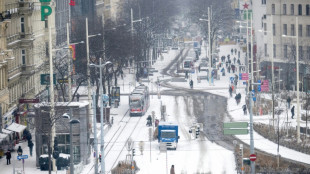 Freezing rain hampers transport in Central Europe
Freezing rain hampers transport in Central Europe
-
Nuuk, Copenhagen cautiously mull Greenland independence

-
 'Proving the boys wrong': Teenage racers picked for elite driver programme
'Proving the boys wrong': Teenage racers picked for elite driver programme
-
Mbappe absent from training as Arbeloa takes charge at Real Madrid

-
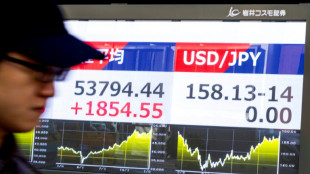 Iran worries push up oil price as world stocks diverge
Iran worries push up oil price as world stocks diverge
-
Volvo Cars pauses battery factory after fruitless partner search

-
 Social media harms teens, watchdog warns, as France weighs ban
Social media harms teens, watchdog warns, as France weighs ban
-
Central bank chiefs voice 'full solidarity' with US Fed, Powell
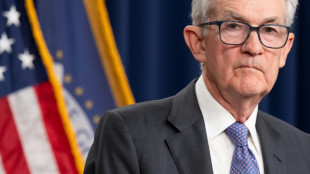
-
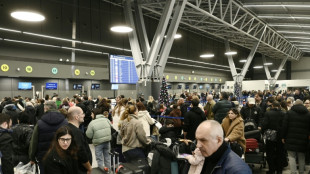 Greece airspace shutdown exposes badly outdated systems
Greece airspace shutdown exposes badly outdated systems
-
France climate goals off track as emissions cuts slow again
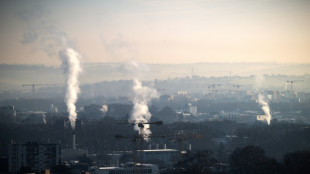
-
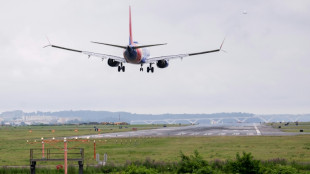 Boeing sells 50 737 MAX jets to leasing group ACG
Boeing sells 50 737 MAX jets to leasing group ACG
-
Freezing rain paralyses transport in Central Europe
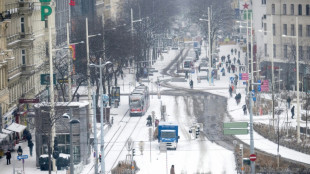
-
 Man Utd reach deal to appoint Carrick as interim boss: reports
Man Utd reach deal to appoint Carrick as interim boss: reports
-
Trump hits Iran trade partners with tariffs as protest toll soars

| SCS | 0.12% | 16.14 | $ | |
| RBGPF | 1.13% | 82.5 | $ | |
| CMSC | 0.34% | 23.39 | $ | |
| GSK | -1.18% | 49.8 | $ | |
| RELX | -1.66% | 42.07 | $ | |
| RIO | 1.21% | 83.895 | $ | |
| CMSD | 0.06% | 23.879 | $ | |
| NGG | -2.52% | 77.8 | $ | |
| BCC | 0.76% | 83.595 | $ | |
| RYCEF | -0.06% | 17.28 | $ | |
| BCE | -0.44% | 23.735 | $ | |
| JRI | -0.07% | 13.8 | $ | |
| AZN | -0.1% | 93.54 | $ | |
| VOD | -2.65% | 13.2 | $ | |
| BP | 2.81% | 35.405 | $ | |
| BTI | 1.54% | 56.55 | $ |

Half of species not assessed for endangered list risk extinction: study
More than half of species whose endangered status cannot be assessed due to a lack of data are predicted to face the risk of extinction, according to a machine-learning analysis published Thursday.
The International Union for the Conservation of Nature (IUCN) currently has nearly 150,000 entries on its Red List for threatened species, including some 41,000 species threatened with extinction.
These include 41 percent of amphibians, 38 percent of sharks and rays, 33 percent of reef building corals, 27 percent of mammals and 13 percent of birds.
But there are thousands of species that the IUCN has been unable to categorise as they are "data insufficient" and are not on the Red List even though they live in the same regions and face similar threats to those species that have so far been assessed.
Researchers from the Norwegian University of Science and Technology used a machine learning technique to predict the likelihood of 7,699 data deficient species being at risk of extinction.
They trained the algorithm on a list of more than 26,000 species that the IUCN has been able to categorise, incorporating data on the regions where species live and other factors known to influence biodiversity to determine whether it predicted their extinction risk status.
"These could include climatic conditions, land use conditions or land use changes, pesticide use, threats from invasive species or really a range of different stressors," lead author Jan Borgelt, from the university's Industrial Ecology Programme, told AFP.
After comparing the algorithm's results with the IUCN's lists, the team then applied it to predict the data deficient species' extinction risk.
Writing in the journal Communications Biology, they found that 4,336 species -- or 56 percent of those sampled -- were likely threatened with extinction, including 85 percent of amphibians and 61 percent of mammals.
This compares to the 28 percent of species assessed by the IUCN Red List.
"We see that across most land areas and coastal areas around the world that the average extinction risk would be higher if we included data deficient species," said Borgelt.
A global United Nations biodiversity assessment in 2019 warned that as many as a million species were threatened with extinction due to a number of factors including habitat loss, invasive species and climate change.
Borgelt said the analysis revealed some hotspots for data-deficient species risk, including Madagascar and southern India. He said he hoped the study could help the IUCN develop its strategy for underreported species, adding that the team had reached out to the union.
"With these predictions from machine learning we can get really sort of pre-assessments or we could use those as predictions to prioritise which species have to be looked at by the IUCN," he said.
Head of the IUCN's Red List Craig Hilton-Taylor said the organisation was continuously harnessing new technology with a view to reduce the number of data deficient species.
"We also understand that a proportion of data deficient species are at risk of extinction, and include this in our calculations when we estimate the proportion of threatened species in a group," he told AFP.
D.Khalil--SF-PST



